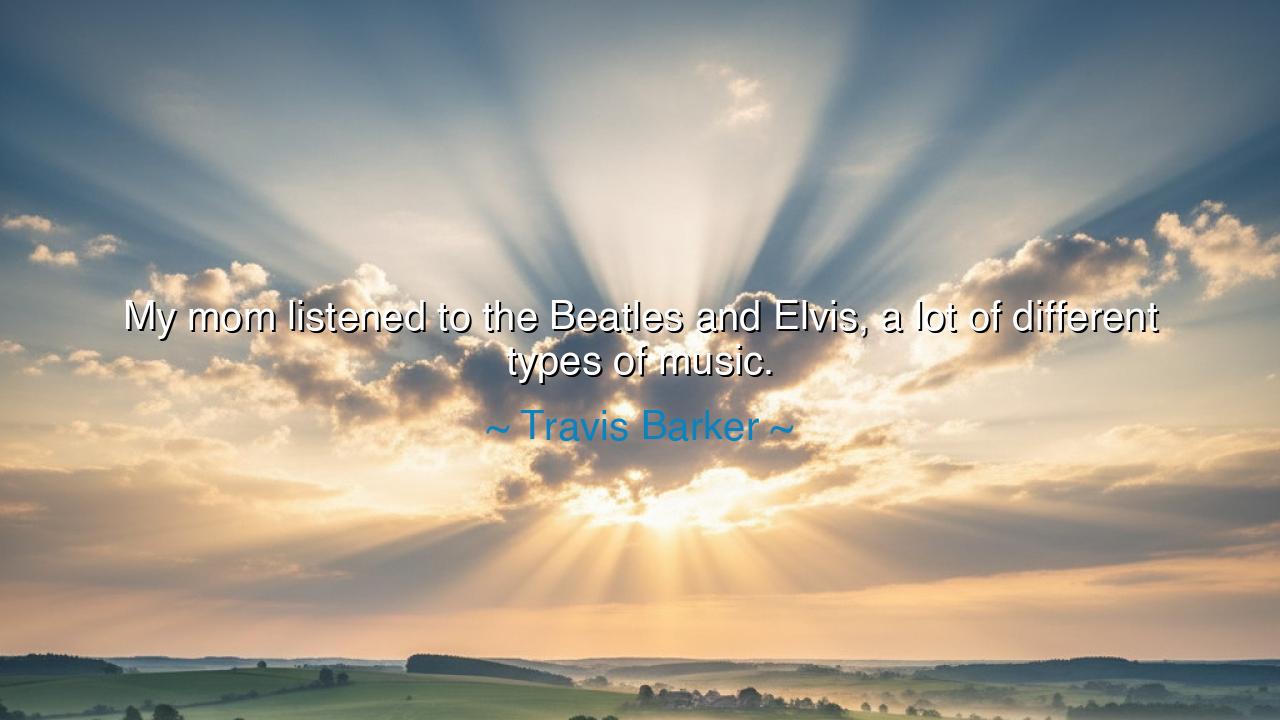
My mom listened to the Beatles and Elvis, a lot of different






Hear, O children of rhythm and heirs of song, the words of Travis Barker, drummer of fire and keeper of pulse: “My mom listened to the Beatles and Elvis, a lot of different types of music.” In this simple remembrance lies the story of inheritance, for music is not only heard but passed down, shaping the heart of the listener and guiding the soul of the artist. What his mother listened to did not remain hers alone—it became the foundation of his own sound, the unseen hand that set his spirit beating before he even touched the drums.
The meaning of his words is that influence often flows quietly, through the everyday choices of those who raise us. A mother’s love of The Beatles and Elvis, her openness to “different types of music,” was not mere entertainment; it was an initiation. The Beatles carried the harmonies of invention, blending pop with philosophy, lightness with depth. Elvis embodied rebellion, soul, and fire, fusing gospel, rhythm, and rock into a force that reshaped culture. For Barker, these voices became part of his bloodline—not through study, but through the very air of his childhood home.
History is filled with such legacies. Johann Sebastian Bach grew up in a family of musicians, where the sound of organ and violin was as common as the sound of footsteps. In the same way, young Wolfgang Amadeus Mozart was raised in the presence of his father’s compositions, his genius nurtured by constant exposure to music. What we hear in our youth becomes the soil in which our talents grow. So too did Barker, whose thunderous rhythms with Blink-182 and beyond were rooted in the diverse tapestry of sounds his mother gave him.
There is also a deeper truth in his mother’s openness to “a lot of different types of music.” To confine oneself to one genre, one tradition, is to live in a narrow world. But to listen broadly is to expand the soul, to learn from contrasts, to draw strength from diversity. The Beatles and Elvis were different in style and era, yet both carried truth in sound. By embracing both, Barker’s mother passed down not only melodies but wisdom: that greatness often comes from blending influences, from refusing to be bound by a single note.
The lesson here is powerful: what we surround ourselves with becomes the architecture of our spirit. The songs we play, the books we read, the voices we heed—all shape us in ways unseen. A child who grows among narrow walls may never know the vastness of the horizon. But a child who grows hearing “a lot of different types of music” is taught early that the world is wide, that creativity thrives when it drinks from many streams.
The warning is that we must be mindful of the inheritance we pass on. Not only to children, but to those around us. What we celebrate, they will remember. What we play, they will absorb. If we pass down only fear or smallness, that is what will grow. But if we pass down openness, curiosity, and courage—as Barker’s mother did—then the next generation will build upon that gift and create wonders of their own.
As for practical action, let each person cultivate an openness to many voices. Listen to music beyond your preference, read books beyond your comfort, speak with people beyond your circle. And if you are a parent, guardian, or mentor, fill your home not only with what pleases you, but with what may inspire others to grow beyond you. For the inheritance of influence is not measured in gold or property, but in the seeds planted in the soul.
Thus, Travis Barker’s words are not just nostalgia, but teaching: “My mom listened to the Beatles and Elvis, a lot of different types of music.” In them we see the truth that the songs of one generation become the foundation of the next, and that the openness of a single heart can shape the destiny of another. Let us, then, live with such awareness, that those who come after us may inherit not narrowness, but a symphony of possibility.






AAdministratorAdministrator
Welcome, honored guests. Please leave a comment, we will respond soon